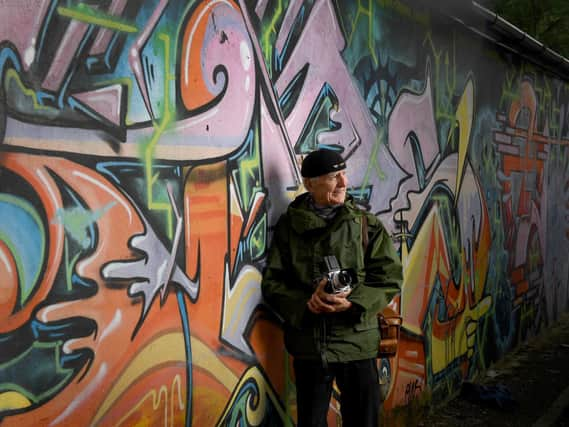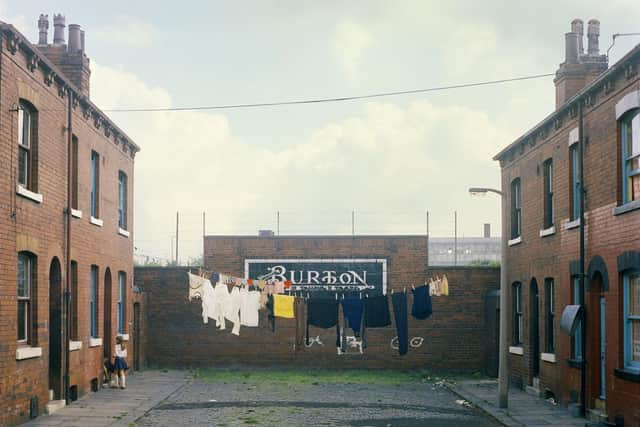This photographer has captured the lost corners of Leeds - and here is what the city looked like in the 1970s and 80s


Peter Mitchell is one of the handful of people in Britain who hasn’t used lockdown to clear out a cupboard or two. He hasn’t even picked up a duster and with the floors covered in boxes, files and the occasional 1930s aeroplane seat, if he owns a vacuum it hasn’t seen much use.
“Oh lord, it’s chaos,” says the 77 year old. “You know, I did think I might use this time to have a sort through, but well other things got in the way. I do sometimes wonder how I can live like this, but then I have for almost 50 years, so I suspect it’s not going to change now.”
Advertisement
Hide AdAdvertisement
Hide AdThe ‘other things’ which distracted Mitchell from his domestic duties include the publication of a new photographic book and it’s one which is a tribute to one man’s talent for hoarding. The images were rescued from the ‘used file folder’ by Mitchell’s agent, who insisted that there was value in the photographs which had been discarded, along with 500 others, years before.


Taken during the 1970s and 80s when Leeds’s traditional back-to-backs and red-brick terrace streets were being replaced by modern housing developments and out-of-town shopping centres, together they capture a time before the arrival of drive-through McDonald’s.
These are streets which look bare without a full washing line strung from one side to another and where piles of rubble from some recently demolished property became temporary playgrounds for a generation of children raised on a diet of fish fingers and Angel Delight.
“At that time it felt like the whole of Leeds was being bashed down,” says Mitchell, who came to Leeds in the 70s to visit friends and never left. “Entire streets were suddenly vulnerable and I suppose I saw it as my job to capture them before they went. This collection also has the feel of a city which hasn’t yet woken up. There are very few people on them, there’s a lack of a human presence.”


Advertisement
Hide AdAdvertisement
Hide AdMitchell has always had a frugal approach to his craft. While some photographers take dozens of shots of the same image, he only ever shoots a handful and only the best makes it to the printers.
He can’t remember exactly why each of the photographs in the new Early Sunday Morning collection originally ended up on the reject pile, but he admits that had it not been for his agent and fellow photographer John Myers, who edited the book, they would have remained there.
“This is very much a traditional photobook,” he says, sounding not unlike a child forced to wear his Sunday best against his will. “It’s all beautifully laid out, there’s no text and there’s lots of blank pages to emphasise its sophistication.
“Left to my own devices I tend to go for something a little more quirky, but what this whole process taught me is that sometimes it can be good to have an alien eye cast over your work. It forces you to look closely at images you might have dismissed. It made me notice a cat sitting on a wall or a dog at the edge of the frame that I hadn’t seen before.”
Advertisement
Hide AdAdvertisement
Hide AdThere is some lovely detail here, like the children watching on as two firefighters inspect a burnt out row of shops, the window display of a wallpaper shop doing its best to sell dreams of ideal homes next to its boarded-up neighbour and the image of Maureen Fashions – the ’s dropped off before Mitchell arrived – whose clothing range appeared to extend to no more than a basket of hand me downs.
“When looking at images of the past there is always a danger of misplaced nostalgia,” he says “I’m not Rod Stewart romanticising about growing up in a back-to-back, but I did feel compelled to take these pictures before these places disappeared forever.
“Some people describe my photographic style as ‘painterly’. This is my portrait of Leeds, but I’m sure that similar images could have been taken of any other town and city.”
Perhaps, but even aside from the red-brick streets and the advertisements for Tetley beer and Burton’s tailors there is something unashamedly northern about Mitchell’s work.
Advertisement
Hide AdAdvertisement
Hide Ad“I’d been living in London and what I loved about Leeds is that you could walk everywhere,” he says. “And as a photographer there seemed to be something new and interesting around every corner.”
His knowledge of the city was helped by working as a delivery driver and while photography has always been his first love, he has struggled to make it pay. Mitchell spent much of his working life as a graphic designer, creating posters for museums and galleries, but then four years ago his work suddenly began to garner international attention.
“I’d unexpectedly acquired an agent,” he says, referring to Bristol-based Rudi Thoemmes. “He’s a dealer in photographic and antiquarian books and during one stock take he realised my book Strangely Familiar had sold rather well, or at least well by photographic standards.
“He asked around and while I think most people had never heard of me, the photographer Martin Parr, who also lives in Bristol, encouraged him to represent me and well, the rest of history.”
Advertisement
Hide AdAdvertisement
Hide AdEver since, Thoemmes has been on something of a mission to tell the world about Mitchell and albeit belatedly, word does seem to be spreading. A couple of years ago his work was showcased at the Arles photography festival, the author Geoff Dyer wrote a warm profile of Mitchell in the New York Times and in 2016 the Impressions Gallery in Bradford hosted the first major solo exhibition of his work. He also has more than 19,000 followers on Instagram, not that he has ever looked at the site.
“Rudi takes care of that,” says Mitchell, who has remained resolutely analogue. He doesn’t own a laptop, can only be contacted via landline and he has refused to swap his heavy Hasselblad camera for a lighter, slimline equivalent. “I am not one for change. I do take a couple more shots than I used to because my eyesight isn’t what it was, although it’s better than Dominic Cummings’. Everything else though is much as it was.
“Take my Honda Civic – it is completely ruined and so old they don’t even make parts for it anymore. The sensible thing would be to part-exchange it for a cost efficient Fiat, but that would seem like a betrayal, so I will keep driving it despite the terrible clanging.”
While trawling car showrooms is not on Mitchell’s to-do list, he does have other projects on the horizon. He wants to create two masterworks, one dedicated to a fairground owner who Mitchell photographed intermittently next to his gradually-rusting ghost train and the other, a tribute to the street in the north Leeds suburb where he lives.
Advertisement
Hide AdAdvertisement
Hide AdThere should be a third project – a retrospective of his work in his home city. It was back in 1975 that Leeds City Art Gallery displayed a few of Mitchell’s photographs, but since then his work has been conspicuous only by its absence.
“I have managed in obscurity pretty well,” he laughs. “I don’t need attention, although it was very nice to get an honorary degree from Leeds Arts University the other year. In fact, what I am saying? I would love an exhibition in Leeds, one where the mayor could come and present me with a great big medal.
“Although if I did allow myself to be embraced by the establishment I would probably have no option but to stop taking photographs and become a sad alcoholic shouting nonsense on street corners.”
Early Sunday Morning is out now priced £50. Prints from the book are also available to buy via the website at rrbphotobooks.com
Advertisement
Hide AdAdvertisement
Hide AdFor more stories from the YP Magazine and The Yorkshire Post features team, visit our Facebook page.
Editor’s note: first and foremost - and rarely have I written down these words with more sincerity - I hope this finds you well.
Almost certainly you are here because you value the quality and the integrity of the journalism produced by The Yorkshire Post’s journalists - almost all of which live alongside you in Yorkshire, spending the wages they earn with Yorkshire businesses - who last year took this title to the industry watchdog’s Most Trusted Newspaper in Britain accolade.
And that is why I must make an urgent request of you: as advertising revenue declines, your support becomes evermore crucial to the maintenance of the journalistic standards expected of The Yorkshire Post. If you can, safely, please buy a paper or take up a subscription. We want to continue to make you proud of Yorkshire’s National Newspaper but we are going to need your help.
Advertisement
Hide AdAdvertisement
Hide AdPostal subscription copies can be ordered by calling 0330 4030066 or by emailing [email protected]. Vouchers, to be exchanged at retail sales outlets - our newsagents need you, too - can be subscribed to by contacting subscriptions on 0330 1235950 or by visiting www.localsubsplus.co.uk where you should select The Yorkshire Post from the list of titles available.
If you want to help right now, download our tablet app from the App / Play Stores. Every contribution you make helps to provide this county with the best regional journalism in the country.
Sincerely. Thank you.
James Mitchinson